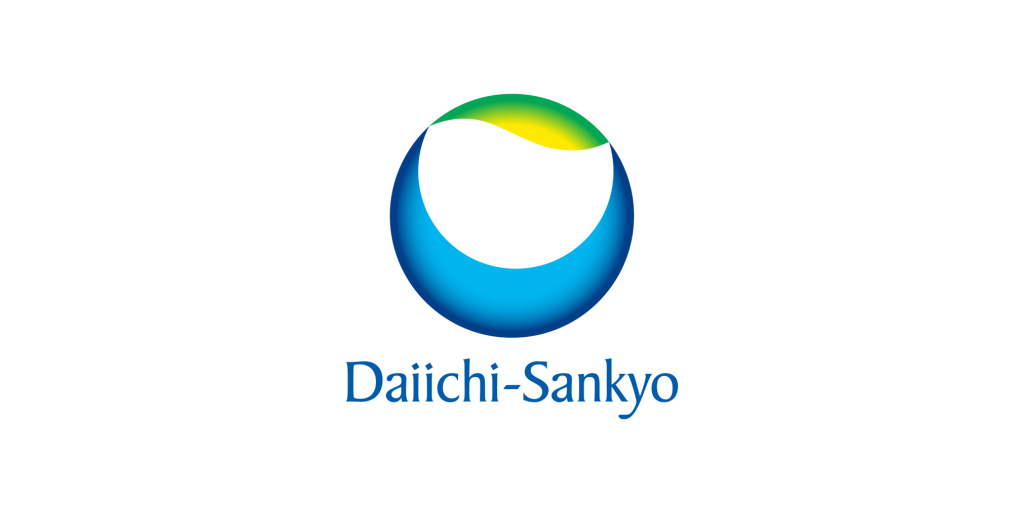- Survival results for Daiichi Sankyo and AstraZeneca’s datopotamab deruxtecan in TROPION-Breast01 did not achieve statistical significance versus chemotherapy
- Trial previously met the dual primary endpoint of progression-free survival
TOKYO & BASKING RIDGE, N.J.--(BUSINESS WIRE)--Topline results from the TROPION-Breast01 phase 3 trial of datopotamab deruxtecan (Dato-DXd) compared to investigator’s choice of chemotherapy, which previously met the dual primary endpoint of progression-free survival (PFS), did not achieve statistical significance in the final overall survival (OS) analysis in patients with inoperable or metastatic hormone receptor (HR) positive, HER2 low or negative (IHC 0, IHC 1+ or IHC 2+/ISH-) breast cancer previously treated with endocrine-based therapy and at least one systemic therapy.
Datopotamab deruxtecan is a specifically engineered TROP2 directed DXd antibody drug conjugate (ADC) discovered by Daiichi Sankyo (TSE: 4568) and being jointly developed by Daiichi Sankyo and AstraZeneca (LSE/STO/Nasdaq: AZN).
This analysis follows the positive PFS results presented at the 2023 European Society for Medical Oncology Congress which showed datopotamab deruxtecan demonstrated a statistically significant and clinically meaningful improvement in PFS. An improvement in patient-reported outcomes was also seen.1 The PFS data and additional results for key secondary endpoints were published this month in the Journal of Clinical Oncology.
The safety profile of datopotamab deruxtecan was consistent with that observed in the previous analysis, including lower rates of grade 3 or higher treatment-related adverse events compared to chemotherapy, and no new safety concerns identified. All grade interstitial lung disease (ILD) rates remained low with no new grade 3 or higher ILD events observed.
With ADCs approved during the course of the trial, including ENHERTU® (trastuzumab deruxtecan), subsequent treatment following patients’ disease progression or treatment discontinuation is likely to have affected survival results.
“Datopotamab deruxtecan has previously shown a statistically significant progression-free survival benefit in TROPION-Breast01, a result supported by multiple meaningful secondary measures including patient-reported outcomes,” said Ken Takeshita, MD, Global Head, R&D, Daiichi Sankyo. “We are proud to have brought forth a new standard of care for patients with metastatic breast cancer with ENHERTU and we remain committed to making datopotamab deruxtecan another potential option for patients who can benefit.”
“The metastatic HR positive breast cancer treatment landscape has advanced remarkably in the last several years to the benefit of patients,” said Susan Galbraith, MBBChir, PhD, Executive Vice President, Oncology R&D, AstraZeneca. “Based on the TROPION-Breast01 results, there is evidence of the clinical value of datopotamab deruxtecan in this setting. We will continue discussions with regulatory authorities and apply insights from these results to our clinical development program for datopotamab deruxtecan in breast cancer.”
The data will be presented at an upcoming medical meeting and shared with regulatory authorities currently reviewing applications for this indication.
In addition to TROPION-Breast01, Daiichi Sankyo and AstraZeneca are evaluating datopotamab deruxtecan alone and with immunotherapy as treatment for patients with triple negative or HR low, HER2 negative breast cancers in the TROPION-Breast02, TROPION-Breast03, TROPION-Breast04 and TROPION-Breast05 phase 3 trials.
About TROPION-Breast01
TROPION-Breast01 is a global, randomized, multicenter, open-label phase 3 trial evaluating the efficacy and safety of datopotamab deruxtecan (6.0 mg/kg) versus investigator’s choice of single-agent chemotherapy (eribulin, capecitabine, vinorelbine or gemcitabine) in adult patients with unresectable or metastatic HR positive, HER2 low or negative (IHC 0, IHC 1+ or IHC 2+/ISH-) breast cancer who have progressed on and are not suitable for endocrine therapy per investigator assessment and have received at least one additional systemic therapy for unresectable or metastatic disease.
Following disease progression or discontinuation of datopotamab deruxtecan or chemotherapy, patients had the option to receive subsequent treatment at the discretion of their physician. Crossover between trial arms was not permitted.
The dual primary endpoints of TROPION-Breast01 are PFS as assessed by blinded independent central review and OS. Key secondary endpoints include objective response rate, duration of response, investigator-assessed PFS, disease control rate, time to first subsequent therapy and safety.
TROPION-Breast01 enrolled more than 700 patients in Africa, Asia, Europe, North America and South America. For more information visit ClinicalTrials.gov.
About Hormone Receptor Positive Breast Cancer
Breast cancer is the second most common cancer and one of the leading causes of cancer-related deaths worldwide.2 More than two million breast cancer cases were diagnosed in 2022, with more than 665,000 deaths globally.2 While survival rates are high for those diagnosed with early breast cancer, less than 35% of patients diagnosed with or who progress to metastatic disease are expected to live five years following diagnosis.3
Approximately 70% of diagnosed cases are considered what has been historically called HR positive, HER2 negative breast cancer (measured as HER2 score of IHC 0, IHC 1+ or IHC 2+/ISH-).3 Endocrine therapies are widely given consecutively in the early lines of treatment for HR positive metastatic breast cancer.4 However, following two lines of endocrine therapy, further efficacy with additional endocrine treatment is often limited.4 The current standard of care following endocrine therapy is chemotherapy, which is associated with poor response rates and outcomes.4,5,6,7
TROP2 is a protein broadly expressed in HR positive, HER2 negative breast cancer and is associated with increased tumor progression and poor survival.8,9
About Datopotamab Deruxtecan (Dato-DXd)
Datopotamab deruxtecan (Dato-DXd) is an investigational TROP2 directed ADC. Designed using Daiichi Sankyo’s proprietary DXd ADC Technology, datopotamab deruxtecan is one of six DXd ADCs in the oncology pipeline of Daiichi Sankyo, and one of the most advanced programs in AstraZeneca’s ADC scientific platform. Datopotamab deruxtecan is comprised of a humanized anti-TROP2 IgG1 monoclonal antibody, developed in collaboration with Sapporo Medical University, attached to a number of topoisomerase I inhibitor payloads (an exatecan derivative, DXd) via tetrapeptide-based cleavable linkers.
A comprehensive global clinical development program is underway with more than 20 trials evaluating the efficacy and safety of datopotamab deruxtecan across multiple cancers, including non-small cell lung cancer, triple negative breast cancer and HR positive, HER2 negative breast cancer. The program includes seven phase 3 trials in lung cancer and five phase 3 trials in breast cancer evaluating datopotamab deruxtecan as a monotherapy and in combination with other anticancer treatments in various settings.
About the Daiichi Sankyo and AstraZeneca Collaboration
Daiichi Sankyo and AstraZeneca entered into a global collaboration to jointly develop and commercialize ENHERTU in March 2019 and datopotamab deruxtecan (Dato-DXd) in July 2020, except in Japan where Daiichi Sankyo maintains exclusive rights for each ADC. Daiichi Sankyo is responsible for the manufacturing and supply of ENHERTU and datopotamab deruxtecan.
About the ADC Portfolio of Daiichi Sankyo
The Daiichi Sankyo ADC portfolio consists of seven ADCs in clinical development crafted from two distinct ADC technology platforms discovered in-house by Daiichi Sankyo.
The ADC platform furthest in clinical development is Daiichi Sankyo’s DXd ADC Technology where each ADC consists of a monoclonal antibody attached to a number of topoisomerase I inhibitor payloads (an exatecan derivative, DXd) via tetrapeptide-based cleavable linkers. The DXd ADC portfolio currently consists of ENHERTU, a HER2 directed ADC, and datopotamab deruxtecan (Dato-DXd), a TROP2 directed ADC, which are being jointly developed and commercialized globally with AstraZeneca. Patritumab deruxtecan (HER3-DXd), a HER3 directed ADC, ifinatamab deruxtecan (I-DXd), a B7-H3 directed ADC, and raludotatug deruxtecan (R-DXd), a CDH6 directed ADC, are being jointly developed and commercialized globally with Merck. DS-3939, a TA-MUC1 directed ADC, is being developed by Daiichi Sankyo.
The second Daiichi Sankyo ADC platform consists of a monoclonal antibody attached to a modified pyrrolobenzodiazepine (PBD) payload. DS-9606, a CLDN6 directed PBD ADC, is the first of several planned ADCs in clinical development utilizing this platform.
Datopotamab deruxtecan, ifinatamab deruxtecan, patritumab deruxtecan, raludotatug deruxtecan, DS-3939 and DS-9606 are investigational medicines that have not been approved for any indication in any country. Safety and efficacy have not been established.
ENHERTU U.S. Important Safety Information
Indications
ENHERTU is a HER2-directed antibody and topoisomerase inhibitor conjugate indicated for the treatment of adult patients with:
- Unresectable or metastatic HER2-positive (IHC 3+ or ISH positive) breast cancer who have received a prior anti-HER2-based regimen either:
– In the metastatic setting, or
– In the neoadjuvant or adjuvant setting and have developed disease recurrence during or within six months of completing therapy
-
Unresectable or metastatic HER2-low (IHC 1+ or IHC 2+/ISH-) breast cancer, as determined by an FDA-approved test, who have received a prior chemotherapy in the metastatic setting or developed disease recurrence during or within 6 months of completing adjuvant chemotherapy
-
Unresectable or metastatic non-small cell lung cancer (NSCLC) whose tumors have activating HER2 (ERBB2) mutations, as detected by an FDA-approved test, and who have received a prior systemic therapy
This indication is approved under accelerated approval based on objective response rate and duration of response. Continued approval for this indication may be contingent upon verification and description of clinical benefit in a confirmatory trial.
- Locally advanced or metastatic HER2-positive (IHC 3+ or IHC 2+/ISH positive) gastric or gastroesophageal junction (GEJ) adenocarcinoma who have received a prior trastuzumab-based regimen
-
Unresectable or metastatic HER2-positive (IHC3+) solid tumors who have received prior systemic treatment and have no satisfactory alternative treatment options
This indication is approved under accelerated approval based on objective response rate and duration of response. Continued approval for this indication may be contingent upon verification and description of clinical benefit in a confirmatory trial.
| WARNING: INTERSTITIAL LUNG DISEASE and EMBRYO-FETAL TOXICITY |
|
Contraindications
None.
Warnings and Precautions
Interstitial Lung Disease / Pneumonitis
Severe, life-threatening, or fatal interstitial lung disease (ILD), including pneumonitis, can occur in patients treated with ENHERTU. A higher incidence of Grade 1 and 2 ILD/pneumonitis has been observed in patients with moderate renal impairment. Advise patients to immediately report cough, dyspnea, fever, and/or any new or worsening respiratory symptoms. Monitor patients for signs and symptoms of ILD. Promptly investigate evidence of ILD. Evaluate patients with suspected ILD by radiographic imaging. Consider consultation with a pulmonologist. For asymptomatic ILD/pneumonitis (Grade 1), interrupt ENHERTU until resolved to Grade 0, then if resolved in ≤28 days from date of onset, maintain dose. If resolved in >28 days from date of onset, reduce dose one level. Consider corticosteroid treatment as soon as ILD/pneumonitis is suspected (e.g., ≥0.5 mg/kg/day prednisolone or equivalent). For symptomatic ILD/pneumonitis (Grade 2 or greater), permanently discontinue ENHERTU. Promptly initiate systemic corticosteroid treatment as soon as ILD/pneumonitis is suspected (e.g., ≥1 mg/kg/day prednisolone or equivalent) and continue for at least 14 days followed by gradual taper for at least 4 weeks.
HER2-Positive or HER2-Low Metastatic Breast Cancer, HER2-Mutant NSCLC, and Solid Tumors (Including IHC 3+) (5.4 mg/kg)
In patients with metastatic breast cancer, HER2-mutant NSCLC, and other solid tumors treated with ENHERTU 5.4 mg/kg, ILD occurred in 12% of patients. Median time to first onset was 5.5 months (range: 0.9 to 31.5). Fatal outcomes due to ILD and/or pneumonitis occurred in 1.0% of patients treated with ENHERTU.
HER2-Positive Locally Advanced or Metastatic Gastric Cancer (6.4 mg/kg)
In patients with locally advanced or metastatic HER2-positive gastric or GEJ adenocarcinoma treated with ENHERTU 6.4 mg/kg, ILD occurred in 10% of patients. Median time to first onset was 2.8 months (range: 1.2 to 21).
Neutropenia
Severe neutropenia, including febrile neutropenia, can occur in patients treated with ENHERTU. Monitor complete blood counts prior to initiation of ENHERTU and prior to each dose, and as clinically indicated. For Grade 3 neutropenia (Absolute Neutrophil Count [ANC] <1.0 to 0.5 x 109/L), interrupt ENHERTU until resolved to Grade 2 or less, then maintain dose. For Grade 4 neutropenia (ANC <0.5 x 109/L), interrupt ENHERTU until resolved to Grade 2 or less, then reduce dose by one level. For febrile neutropenia (ANC <1.0 x 109/L and temperature >38.3º C or a sustained temperature of ≥38º C for more than 1 hour), interrupt ENHERTU until resolved, then reduce dose by one level.
HER2-Positive or HER2-Low Metastatic Breast Cancer, HER2-Mutant NSCLC, and Solid Tumors (Including IHC 3+) (5.4 mg/kg)
In patients with metastatic breast cancer, HER2-mutant NSCLC, and other solid tumors treated with ENHERTU 5.4 mg/kg, a decrease in neutrophil count was reported in 63% of patients. Seventeen percent had Grade 3 or 4 decreased neutrophil count. Median time to first onset of decreased neutrophil count was 22 days (range: 2 to 939). Febrile neutropenia was reported in 1% of patients.
HER2-Positive Locally Advanced or Metastatic Gastric Cancer (6.4 mg/kg)
In patients with locally advanced or metastatic HER2-positive gastric or GEJ adenocarcinoma treated with ENHERTU 6.4 mg/kg, a decrease in neutrophil count was reported in 72% of patients. Fifty-one percent had Grade 3 or 4 decreased neutrophil count. Median time to first onset of decreased neutrophil count was 16 days (range: 4 to 187). Febrile neutropenia was reported in 4.8% of patients.
Left Ventricular Dysfunction
Patients treated with ENHERTU may be at increased risk of developing left ventricular dysfunction. Left ventricular ejection fraction (LVEF) decrease has been observed with anti-HER2 therapies, including ENHERTU. Assess LVEF prior to initiation of ENHERTU and at regular intervals during treatment as clinically indicated. Manage LVEF decrease through treatment interruption. When LVEF is >45% and absolute decrease from baseline is 10-20%, continue treatment with ENHERTU. When LVEF is 40-45% and absolute decrease from baseline is <10%, continue treatment with ENHERTU and repeat LVEF assessment within 3 weeks. When LVEF is 40-45% and absolute decrease from baseline is 10-20%, interrupt ENHERTU and repeat LVEF assessment within 3 weeks. If LVEF has not recovered to within 10% from baseline, permanently discontinue ENHERTU. If LVEF recovers to within 10% from baseline, resume treatment with ENHERTU at the same dose. When LVEF is <40% or absolute decrease from baseline is >20%, interrupt ENHERTU and repeat LVEF assessment within 3 weeks. If LVEF of <40% or absolute decrease from baseline of >20% is confirmed, permanently discontinue ENHERTU. Permanently discontinue ENHERTU in patients with symptomatic congestive heart failure. Treatment with ENHERTU has not been studied in patients with a history of clinically significant cardiac disease or LVEF <50% prior to initiation of treatment.
HER2-Positive or HER2-Low Metastatic Breast Cancer, HER2-Mutant NSCLC, and Solid Tumors (Including IHC 3+) (5.4 mg/kg)
In patients with metastatic breast cancer, HER2-mutant NSCLC, and other solid tumors treated with ENHERTU 5.4 mg/kg, LVEF decrease was reported in 3.8% of patients, of which 0.6% were Grade 3.
HER2-Positive Locally Advanced or Metastatic Gastric Cancer (6.4 mg/kg)
In patients with locally advanced or metastatic HER2-positive gastric or GEJ adenocarcinoma treated with ENHERTU 6.4 mg/kg, no clinical adverse events of heart failure were reported; however, on echocardiography, 8% were found to have asymptomatic Grade 2 decrease in LVEF.
Embryo-Fetal Toxicity
ENHERTU can cause fetal harm when administered to a pregnant woman. Advise patients of the potential risks to a fetus. Verify the pregnancy status of females of reproductive potential prior to the initiation of ENHERTU. Advise females of reproductive potential to use effective contraception during treatment and for 7 months after the last dose of ENHERTU. Advise male patients with female partners of reproductive potential to use effective contraception during treatment with ENHERTU and for 4 months after the last dose of ENHERTU.
Additional Dose Modifications
Thrombocytopenia
For Grade 3 thrombocytopenia (platelets <50 to 25 x 109/L) interrupt ENHERTU until resolved to Grade 1 or less, then maintain dose. For Grade 4 thrombocytopenia (platelets <25 x 109/L) interrupt ENHERTU until resolved to Grade 1 or less, then reduce dose by one level.
Adverse Reactions
HER2-Positive and HER2-Low Metastatic Breast Cancer, HER2-Mutant NSCLC, and Solid Tumors (Including IHC 3+) (5.4 mg/kg)
The pooled safety population reflects exposure to ENHERTU 5.4 mg/kg intravenously every 3 weeks in 1799 patients in Study DS8201-A-J101 (NCT02564900), DESTINY-Breast01, DESTINY-Breast02, DESTINY-Breast03, DESTINY-Breast04, DESTINY-Lung01, DESTINY-Lung02, DESTINY-CRC02, and DESTINY-PanTumor02. Among these patients, 65% were exposed for >6 months and 38% were exposed for >1 year. In this pooled safety population, the most common (≥20%) adverse reactions, including laboratory abnormalities, were nausea (73%), decreased white blood cell count (70%), decreased hemoglobin (66%), decreased neutrophil count (63%), decreased lymphocyte count (58%), fatigue (56%), decreased platelet count (48%), increased aspartate aminotransferase (47%), increased alanine aminotransferase (43%), vomiting (40%), increased blood alkaline phosphatase (38%), alopecia (34%), constipation (33%), decreased appetite (32%), decreased blood potassium (31%), diarrhea (29%), musculoskeletal pain (24%), and abdominal pain (20%).
HER2-Positive Metastatic Breast Cancer
DESTINY-Breast03
The safety of ENHERTU was evaluated in 257 patients with unresectable or metastatic HER2-positive breast cancer who received at least one dose of ENHERTU 5.4 mg/kg intravenously once every three weeks in DESTINY-Breast03. The median duration of treatment was 14 months (range: 0.7 to 30).
Serious adverse reactions occurred in 19% of patients receiving ENHERTU. Serious adverse reactions in >1% of patients who received ENHERTU were vomiting, interstitial lung disease, pneumonia, pyrexia, and urinary tract infection. Fatalities due to adverse reactions occurred in 0.8% of patients including COVID-19 and sudden death (one patient each).
ENHERTU was permanently discontinued in 14% of patients, of which ILD/pneumonitis accounted for 8%. Dose interruptions due to adverse reactions occurred in 44% of patients treated with ENHERTU. The most frequent adverse reactions (>2%) associated with dose interruption were neutropenia, leukopenia, anemia, thrombocytopenia, pneumonia, nausea, fatigue, and ILD/pneumonitis. Dose reductions occurred in 21% of patients treated with ENHERTU. The most frequent adverse reactions (>2%) associated with dose reduction were nausea, neutropenia, and fatigue.
The most common (≥20%) adverse reactions, including laboratory abnormalities, were nausea (76%), decreased white blood cell count (74%), decreased neutrophil count (70%), increased aspartate aminotransferase (67%), decreased hemoglobin (64%), decreased lymphocyte count (55%), increased alanine aminotransferase (53%), decreased platelet count (52%), fatigue (49%), vomiting (49%), increased blood alkaline phosphatase (49%), alopecia (37%), decreased blood potassium (35%), constipation (34%), musculoskeletal pain (31%), diarrhea (29%), decreased appetite (29%), headache (22%), respiratory infection (22%), abdominal pain (21%), increased blood bilirubin (20%), and stomatitis (20%).
HER2-Low Metastatic Breast Cancer
DESTINY-Breast04
The safety of ENHERTU was evaluated in 371 patients with unresectable or metastatic HER2-low (IHC 1+ or IHC 2+/ISH-) breast cancer who received ENHERTU 5.4 mg/kg intravenously once every 3 weeks in DESTINY-Breast04. The median duration of treatment was 8 months (range: 0.2 to 33) for patients who received ENHERTU.
Serious adverse reactions occurred in 28% of patients receiving ENHERTU. Serious adverse reactions in >1% of patients who received ENHERTU were ILD/pneumonitis, pneumonia, dyspnea, musculoskeletal pain, sepsis, anemia, febrile neutropenia, hypercalcemia, nausea, pyrexia, and vomiting. Fatalities due to adverse reactions occurred in 4% of patients including ILD/pneumonitis (3 patients); sepsis (2 patients); and ischemic colitis, disseminated intravascular coagulation, dyspnea, febrile neutropenia, general physical health deterioration, pleural effusion, and respiratory failure (1 patient each).
ENHERTU was permanently discontinued in 16% of patients, of which ILD/pneumonitis accounted for 8%. Dose interruptions due to adverse reactions occurred in 39% of patients treated with ENHERTU. The most frequent adverse reactions (>2%) associated with dose interruption were neutropenia, fatigue, anemia, leukopenia, COVID-19, ILD/pneumonitis, increased transaminases, and hyperbilirubinemia. Dose reductions occurred in 23% of patients treated with ENHERTU. The most frequent adverse reactions (>2%) associated with dose reduction were fatigue, nausea, thrombocytopenia, and neutropenia.
The most common (≥20%) adverse reactions, including laboratory abnormalities, were nausea (76%), decreased white blood cell count (70%), decreased hemoglobin (64%), decreased neutrophil count (64%), decreased lymphocyte count (55%), fatigue (54%), decreased platelet count (44%), alopecia (40%), vomiting (40%), increased aspartate aminotransferase (38%), increased alanine aminotransferase (36%), constipation (34%), increased blood alkaline phosphatase (34%), decreased appetite (32%), musculoskeletal pain (32%), diarrhea (27%), and decreased blood potassium (25%).
Contacts
Global/US:
Jennifer Brennan
Daiichi Sankyo, Inc.
jennifer.brennan@daiichisankyo.com
+1 908 900 3183 (mobile)
Japan:
Daiichi Sankyo Co., Ltd.
DS-PR@daiichisankyo.co.jp
Investor Relations Contact:
DaiichiSankyoIR@daiichisankyo.co.jp






